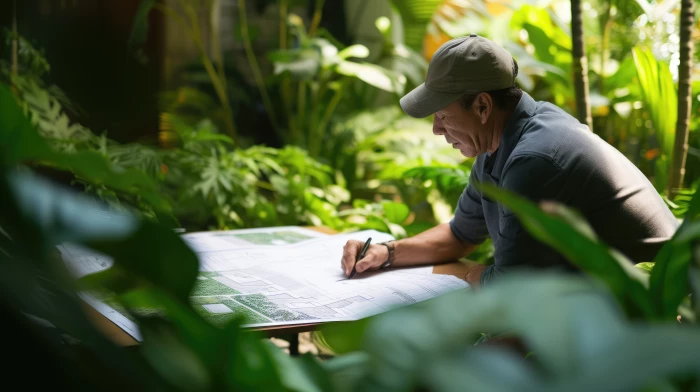
Preliminary Ecological Appraisal in Wellington
Get a free quote for expert preliminary ecological appraisals todayAt Invasive Weed, we specialise in preliminary ecological appraisals (PEAs) in Wellington to support planning applications, land development, and conservation projects while ensuring compliance with UK environmental regulations.
A PEA is a critical first step in assessing the ecological value of a site in Wellington, identifying potential risks, protected species, and necessary mitigation measures before development begins. Many local planning authorities require a PEA as part of planning applications, making it an essential survey for developers, landowners, and project managers.
Our expert team of licensed ecologists provides comprehensive habitat assessments in Wellington, protected species screenings, and environmental impact guidance to help ensure compliance with planning regulations.
For a preliminary ecological appraisal in Wellington and across the UK, contact us today for a free consultation.
What Is the Preliminary Ecological Appraisal Process in Wellington?
First, the preliminary ecological assessments start with a desk study in Wellington.
This is where existing ecological records, mapping data, and conservation designations are looked at to get a sense of the habitat conditions and the presence of protected species.
This is followed by an on-site field survey in Wellington, where ecologists conduct habitat assessments and species identification to determine ecological constraints.
Once data is collected, the analysis phase in Wellington identifies potential ecological risks and opportunities. Finally, a detailed report is produced in Wellington, providing recommendations for mitigation measures, further surveys, and planning considerations to ensure that developments comply with wildlife legislation and environmental planning policies.
What Does a Preliminary Ecological Appraisal Include in Wellington?
A preliminary ecological appraisal in Wellington includes habitat mapping, biodiversity assessment, protected species screening, invasive species identification, and ecological recommendations.
The appraisal in Wellington includes:
Site walkover & habitat mapping in Wellington – Identifies and categorises habitat types such as grasslands, woodlands, wetlands, and waterways.
Flora & fauna assessment in Wellington – Records plant and animal species to evaluate biodiversity value and potential conservation concerns.
Protected species screening in Wellington – Assesses the likelihood of legally protected species, such as bats, badgers, great crested newts, and nesting birds, being present.
Invasive species identification in Wellington – Detects non-native species like Japanese Knotweed and Himalayan Balsam that may require specialist removal.
Ecological constraints & recommendations in Wellington – Advises on further surveys, mitigation strategies, and site management plans to ensure legal compliance and biodiversity protection.
How Much Does a Preliminary Ecological Appraisal Cost in Wellington?
Preliminary ecological appraisal costs range from £500 to £3,500+ in Wellington, depending on site size, survey complexity, and additional ecological requirements.
A small residential development typically costs between £500 and £1,500 in Wellington, while larger commercial or industrial sites may range from £1,500 to £3,500, depending on survey scope and site conditions. If follow-up surveys in Wellington for protected species are required, additional costs may apply, ranging from £800 to £3,000 per species-specific survey.
Additional expenses may include mitigation plans in Wellington (£1,000–£5,000), licensing (£200–£500), and habitat restoration (£1,500–£5,000), depending on project needs and regulatory requirements.
Contact Invasive Weed in Wellington to get customised pricing for a preliminary ecological appraisal in targeted biodiversity.
Is a Permit Required for a Preliminary Ecological Appraisal in Wellington?
A preliminary ecological appraisal makes sure that if the survey identifies protected species or habitats, a mitigation license may be required from Natural England in Wellington or the relevant conservation authority.
The Wildlife and Countryside Act of 1981 and the Habitats Regulations of 2017 in Wellington make it illegal to destroy, damage, or disturb protected species and their habitats. It is also illegal to build on a site that has protected wildlife without doing an ecological assessment or to build, dig, or clear land without using the right mitigation strategies.
Our team assists in obtaining permits, designing mitigation plans, and ensuring full legal compliance in Wellington.
How Long Does a Preliminary Ecological Appraisal Take in Wellington?
A preliminary ecological appraisal (PEA) takes one to four weeks in Wellington, but additional species surveys can extend the process by several months.
A basic PEA can typically be completed within one to two weeks in Wellington, while larger or more complex sites may take three to four weeks. If additional species-specific surveys are required, they may need to be conducted within specific seasonal windows, which could extend the process by several months in Wellington.
To avoid project delays, we recommend scheduling PEAs well in advance to ensure they align with planning application deadlines in Wellington.

What Are the Environmental Considerations in a Preliminary Ecological Appraisal in Wellington?
A preliminary ecological appraisal approach includes mitigation strategies in Wellington such as habitat enhancement, protected species relocation, and buffer zones to maintain ecological balance.
We also ensure compliance with sustainability goals and environmental regulations in Wellington, helping developers minimise environmental impact while achieving project objectives.
Contact Invasive Weed in Wellington to get detailed information on the preliminary ecological appraisal in targeted biodiversity.
We cover Wellington (Somerset)
